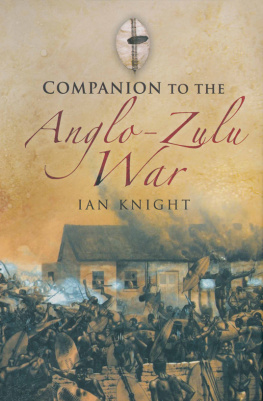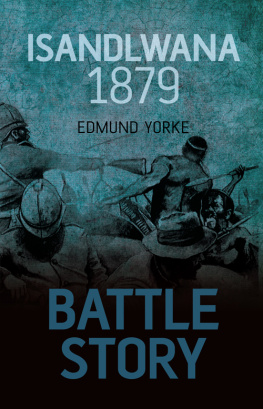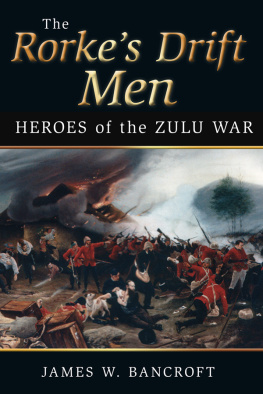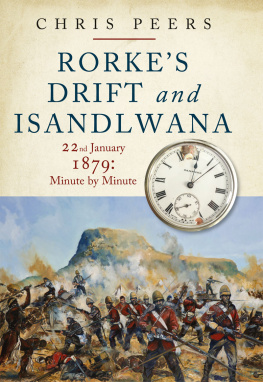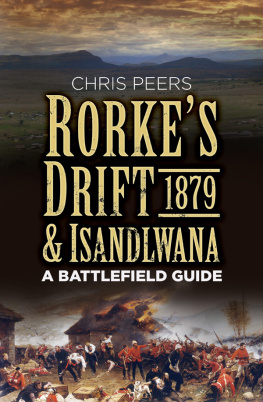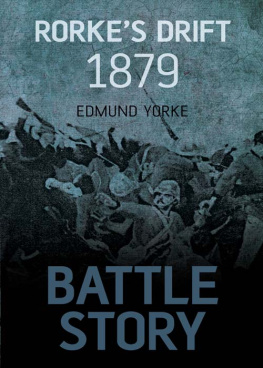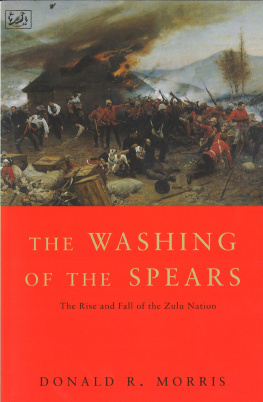Ian Knight - Zulu Rising, The Epic Story of Isandlwana and Rorkes Drift
Here you can read online Ian Knight - Zulu Rising, The Epic Story of Isandlwana and Rorkes Drift full text of the book (entire story) in english for free. Download pdf and epub, get meaning, cover and reviews about this ebook. year: 0, genre: History. Description of the work, (preface) as well as reviews are available. Best literature library LitArk.com created for fans of good reading and offers a wide selection of genres:
Romance novel
Science fiction
Adventure
Detective
Science
History
Home and family
Prose
Art
Politics
Computer
Non-fiction
Religion
Business
Children
Humor
Choose a favorite category and find really read worthwhile books. Enjoy immersion in the world of imagination, feel the emotions of the characters or learn something new for yourself, make an fascinating discovery.
- Book:Zulu Rising, The Epic Story of Isandlwana and Rorkes Drift
- Author:
- Genre:
- Year:0
- Rating:3 / 5
- Favourites:Add to favourites
- Your mark:
- 60
- 1
- 2
- 3
- 4
- 5
Zulu Rising, The Epic Story of Isandlwana and Rorkes Drift: summary, description and annotation
We offer to read an annotation, description, summary or preface (depends on what the author of the book "Zulu Rising, The Epic Story of Isandlwana and Rorkes Drift" wrote himself). If you haven't found the necessary information about the book — write in the comments, we will try to find it.
Zulu Rising, The Epic Story of Isandlwana and Rorkes Drift — read online for free the complete book (whole text) full work
Below is the text of the book, divided by pages. System saving the place of the last page read, allows you to conveniently read the book "Zulu Rising, The Epic Story of Isandlwana and Rorkes Drift" online for free, without having to search again every time where you left off. Put a bookmark, and you can go to the page where you finished reading at any time.
Font size:
Interval:
Bookmark:
Ian Knight
The Epic Story of iSandlwana and Rorkes Drift
PAN BOOKS
For Carolyn, Alex and Libby
Acknowledgements
This book has been over thirty years in the making, and it is impossible to acknowledge all the people who have helped to shape it with their opinions, ideas and knowledge. But some at least must be mentioned; my greatest debt still lies with that great old-time fundi on Zulu life and history, Sighart SB Bourquin, whom I first met when I was visiting the country for the centenary in 1979, and who took me under his wing, taking me exploring in Zululand many times in the 1980s, often camping out on historic sites which host luxury lodges today but then were visited only by a trickle of the keenest of the keen adventures which still burn bright in my memories. Without his enthusiasm and encouragement the history of the old Zulu kingdom would never have come to dominate my life as it has. Ngiyabonga Makhandakhanda.
Since then many people have taken up SBs burden Professor John Laband, without doubt one of the finest scholars of the period, Dr Graham Dominy and his wife Anne, Gillian Scott-Berning in Durban and Graham Smythe during his tenure as curator at the museum at Rorkes Drift. Over the last fifteen years Eric Boswell and Ricky Crathorne have made Zululand accessible to me in a way I firmly believe no one else could, and I greatly treasure the time we spent driving down dusty roads among the hills exploring history and talking to people as the mood took us. My travels have brought me into contact with some remarkable people John Aspinall, Dr Ian Player, Prince Gilenja Biyela, Barry Leitch, Pat Dunn and many descendants of Zulu participants at iSandlwana, such as L.B.Z. Buthelezi, Chelmsford Ntanse, Mdiceni Gumede, Prince Michael Zulu, Paul Cebekhulu and particularly Lindizwe Ngobese, who has given me vivid insights into the life of his forebear, Mehlokazulu kaSihayo. My thanks are due too to Dr Tony Pollard who invited me to participate in the exploratory archaeological survey at iSandlwana in 2000 which offered some fascinating material insights into the battles controversies, and raised many more questions and I owe a special mention to that remarkable American lady Pat Stubbs, whose adventures during the conception, building and running of Isandlwana Lodge I have followed closely, and who has been a charming and elegant host in the happy times I have spent there.
Many people in many libraries, museums and institutions have been unnaturally patient with me over the years, including the staffs of the Campbell Collections in Durban, the Local History Museums in Durban and the National Army Museum in London, Barry Marshall of Amafa KwaZulu-Natali, and successive curators of the Regimental Museum in Brecon, most recently Martin Everett and Celia Green. I have also benefited enormously over the years from the thoughts and advice of a handful of old friends with similar interests, who have proved by turn excellent travelling companions and a willing and mercifully irreverent sounding-board and who have always shared with me the fruits of their own research and collections. Prime among these are Ian Castle, Keith Reeves, Rai England, Bill Cainan, Mike McCabe, Ron Sheeley, Ian Woodason, Tim Day, Stephen Coan and Paul Marais. Many experts on the battle of iSandlwana have picked over the evidence with me, including Colonel Ian Bennett, Donald R. Morris and particularly F.W. David Jackson, whose own work on the subject has defined most subsequent study. Over the years I have also greatly enjoyed my association with Dr Adrian Greaves and the Anglo-Zulu War Historical Society and also the Victorian Military Society.
Most of all, my thanks go to my wife Carolyn and children Alex and Libby, who have sustained and encouraged me throughout.
Note
Throughout the text I have retained original spellings and words in passages quoted directly. After careful consideration it was decided also to retain in such passages words which reflect contemporary racial attitudes, including those which are regarded as highly offensive today; this must be taken as an indication of nineteenth-century perspectives and does not in any sense reflect the opinions of the present author.





Prologue
The sun turned black
When I had gone some way I turned and looked back at this lonesome, formidable hill standing there, a fitting monument for the multitude of dead; immemorially stern, ancient and grand. The twilight was closing in, the sky was red, fading into grey. Over that savage crest trembled one star. Heavens own ornament; near to it gleamed the faint but luminous bow of the new-born moon, that same young moon which once hung above the slain upon this forsaken field of blood. I walked a while picking my way over the stony ridge and dongas where the last stand was made against the roaring flood of foes and again looked back. Now the stark mount had become very black and solemn, the trembling star had sunk or vanished and of the following crescent of the young moon but one horn appeared above the hill. It looked like a plume of faint, unearthly fire burning upon Isandhlwanas rocky brow. This must be a quiet place for a mans eternal sleep. But the scene which went before that sleep!
Sir Henry Rider Haggard,
upon visiting iSandlwana for the first time in 1914
On 21 January 2007 the day before the 128th anniversary of the battle of iSandlwana I found myself, during the full fury of research for this book, perched uncomfortably on the stones which mark out the visitors car-park on the battlefield. It was a typically hot Zululand summers day with temperatures reaching nearly 40C, much as they did on the day of the battle, and the landscape was enveloped in a drowsy stillness.
My companion, munching a packed lunch in silent reverie beside me, had travelled out from England specifically to visit the battlefields on the anniversary. Recently widowed in late middle age, he had come increasingly to draw comfort from a direct family connection with the powerful history that had taken place here his great-grandfather had fought at Rorkes Drift.
Despite the growth in heritage tourism to South Africa in recent years, the battlefield was not busy, and small parties of visitors, staying at the luxurious nearby tourist lodges, were soon swallowed up in the quiet landscape. The words of their guides, evoking with familiar ease the names of long-dead participants in the battle such as young Charlie Raw or Mehlokazulu kaSihayo, were soon lost with them among the boulders, leaving us in the comparative silence of the whispering grass. The car-park is situated uncomfortably in the centre of the killing fields, where the fight raged fiercely hand-to-hand, and in front of us iSandlwana hill, which witnessed it all, faced us blankly, bleached in the sunlight, offering no clues to the drama played out here.
I became aware, after a while, that we were not in fact alone. A small group of Africans was sitting perhaps 50 metres away from us, where the terrain drops away into the Manzimnyama valley behind iSandlwana, almost hidden in the long grass. We had not noticed them because they, too, were largely silent, their body language almost shy, as if they did not want to draw attention to themselves. After a while, however, three young men rose up from among the group and moved further off, walking slowly, their bodies hunched forward in the traditional attitude of respect. Two of them were carrying small rolled grass mats, the third a small green sprig of the
Next pageFont size:
Interval:
Bookmark:
Similar books «Zulu Rising, The Epic Story of Isandlwana and Rorkes Drift»
Look at similar books to Zulu Rising, The Epic Story of Isandlwana and Rorkes Drift. We have selected literature similar in name and meaning in the hope of providing readers with more options to find new, interesting, not yet read works.
Discussion, reviews of the book Zulu Rising, The Epic Story of Isandlwana and Rorkes Drift and just readers' own opinions. Leave your comments, write what you think about the work, its meaning or the main characters. Specify what exactly you liked and what you didn't like, and why you think so.


